111 Search Results for rating scale
March 28, 2024
by Carole Zangari -
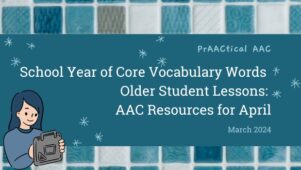
As March draws to a close, we extend our welcome to guest authors Michaela Sullivan and Lindsay Dougherty, who are back with another set of core vocabulary resources for teaching older students. Today, this dynamic team has a rich array of materials and suggestions to help them build fluency with the April core vocabulary words. They also discuss how to support AAC users during a popular classroom activity, shared reading. SCHOOL YEAR OF CORE- Older Student Lessons The Google Slide Resources Weeks 1-2 Google Slides Weeks 3-4 Google Slides INTRODUCTION- April 2024 Welcome back to the School Year of Core – Older student lessons for middle school to adult learners. How are things going? How are the resources working for you and your learners? We would love your feedback and your ideas. If you have any slides that you find work especially well for your students and adult learners, please... [Read More...]
February 29, 2024
by Carole Zangari -
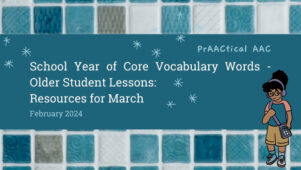
Today, as we prepare to turn another page in the calendar, let’s take a look at the wonderful resources that guest authors Michaela Sullivan and Lindsay Dougherty put together for the March core words. As expected, this dynamic team has some terrific ideas for your older students who are building their skills with core vocabulary. Their slide decks have a wonderful selection of activities that teachers and therapists can use in highlighting the March core vocabulary words. In the post below, they also share helpful information on using extension, expansion, and elaboration in guiding students toward increased linguistic competence. SCHOOL YEAR OF CORE- Older Student Lessons INTRODUCTION- March 2024 To the Parents, Teachers, Educators, Related Service Providers, Speech-Language Pathologists, Paraprofessionals, Friends, and other curious professionals or communicators – Welcome back to month three of the newest iteration of the SYOC- Older Student Lessons (OSL), March edition. We hope that as... [Read More...]
August 8, 2022
by Carole Zangari -
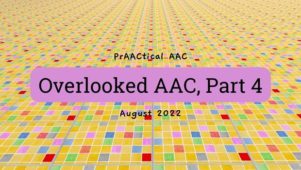
Most employees have job descriptions that offer clarity about what is expected of them and what they are supposed to achieve. Countless professionals work in fields where a Scope of Practice helps them know what they should and shouldn’t be aiming for. Many students have syllabi and rubrics that show them what they’ll need to do for a particular course or assignment. When people, organizations, and systems point us in the right direction, it’s easier for us to meet expectations and achieve goals. This holds true for individuals with AAC needs as well, but professionals often have so many competing priorities that we don’t always make a plan for how to do it. And when we do, we don’t always have the time and bandwidth to fully implement it. Today, we continue the Overlooked AAC series with a look at things that professionals often miss in supporting AAC users when... [Read More...]
December 6, 2021
by Carole Zangari -
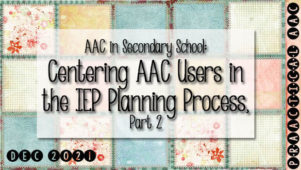
Students with disabilities rarely play an important role in developing and discussing the plan that guides their educational experiences, the IEP. That needs to change. Today, we’re delighted to welcome back AAC SLP Ashley Larisey to continue an important discussion on this topic. Ashley Larisey, an SLP at Community High School District 218 in Oak Lawn, Illinois, discusses ways to support students who use AAC as they prepare to transition out of school in the AAC in Secondary School series. Ashley, who is also an Adjunct Clinical Supervisor and Instructor at Saint Xavier University, has some prAACtical suggestions that are important for school teams, students who use AAC, their families, and school administrators. You can find Ashley’s first post on this topic here. ::::::::::::::::::::::::::::::::::::::::::::::::::::::::::::::::::::::::::::::::::::::::::::::::::::::: Centering AAC Users in the IEP Planning Process Part Two: Putting It into Action Last month, we discussed different strategies for including AAC users in the... [Read More...]
November 22, 2021
by Carole Zangari -
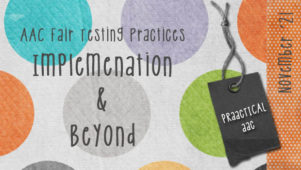
Fair testing practices based on individual needs, abilities, and priorities can be a game-changer for people who use AAC. These are created when teams* come together to engage in collaborative problem-solving and develop a set of guidelines that address an important question: How can we assess this individual so that we are tapping into what they actually know? You can see previous posts in this series here. What Are AAC Fair Testing Practices & Why Should We Use Them? Preparation for the Assessment Modes of Responding in Tests & Assessments The Testing Environment Test Materials Test Administration Procedures Communication & Documentation Today, we explore two final topics. First, we’ll think about the transition from planning our AAC fair testing practices to actually implementing them. Secondly, we’ll consider ways to continue the conversation about these practices with an eye on continuing to refine them over time. TOPIC 14 Implementation: How can... [Read More...]
November 8, 2021
by Carole Zangari -
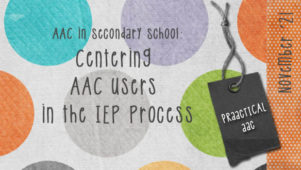
In theory, teenage students with disabilities should play an important role in developing their IEPs and in meetings to discuss them. In practice, this rarely occurs. Today, we’re addressing this important topic with another post in our series focusing on supporting students using AAC during their high school years. AAC SLP Ashley Larisey, an SLP at Community High School District 218 in Oak Lawn, Illinois, is here to discuss ways to support students who use AAC as they prepare to transition out of school. Ashley, who is also an Adjunct Clinical Supervisor and Instructor at Saint Xavier University, has some prAACtical suggestions that are important for school teams, students who use AAC, their families, and school administration. ::::::::::::::::::::::::::::::::::::::::::::::::::::::::::::::::::::::::::::::::::::::::::::::::::::::: Centering AAC Users in the IEP Process When supporting older students who use AAC and are quickly approaching adulthood, our Individualized Education Plans (IEPs), goal development, services, and progress monitoring will... [Read More...]
May 11, 2020
by Carole Zangari -
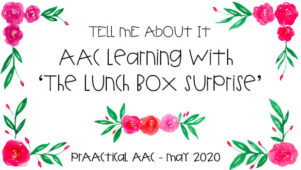
Reading with preschoolers is a great way to build language and AAC skills. Today, we share another post in the TELL ME About It series on incorporating AAC, language, and literacy support with young learnes.. Maggie Judson and Jeanna Antrim are back with more great ideas for AAC intervention, this time focusing on the book, Come Out and Play, Little Mouse. Maggie and Jeanna are speech-language pathologists who work in the Assistive Technology Department for the Belleville Area Special Services Cooperative (BASSC) in central Illinois. They are AT/AAC facilitators and provide evaluations, direct therapy, consultations, and trainings. To read more about how this team prepares for a TELL ME week, check out their previous posts in the TELL ME About It series. Come Out and Play, Little Mouse No, David Go Away Big Green Monster What Do You Like? Here Are My Hands From Head to Toe I Went Walking... [Read More...]
June 18, 2018
by Carole Zangari -
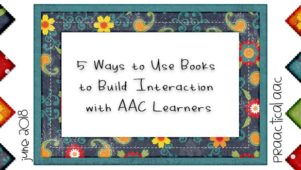
Looking for more ways to build AAC skills? Book reading can be incorporated into therapy sessions and instructional lessons, as well as part of the daily routine at home. Here are some ideas for using books to support AAC and language learning. Choosing a book: In most cases, we want the AAC learner to have the autonomy to choose a book. However, we can make this part of the AAC learning process by teaching the skill of choosing something to read and talking about it before the learner makes his/her choice. Goal Areas: We can use this time to build basic turn-taking skills, requesting, sentence-building, and new vocabulary, among other things. It’s also a great opportunity to develop more advanced syntax using words like ‘since’ and ‘because’ (e.g., “I want to read about sport because it is World Cup time.”) and various sentence structures (e.g., “First, let’s read a sports... [Read More...]
June 1, 2016
by Carole Zangari -
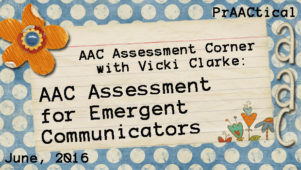
Today, we welcome back Vicki Clarke with more helpful information on conducting AAC assessments. If you work with individual who are at the early stages of communicative development, this post is for you! :::::::::::::::::::::::::::::::::::::::::::::::::::::::::: Some of my most favorite students are those who, at first, may not seem to notice me at all. Sometimes these students seem to exist in their own worlds. They don’t seem to respond in ways we would expect: looking, attending, listening, or gesturing. They may have a diagnosis of Autism, significant developmental delay, epilepsy, or any number of syndromes. I love these kids, and unfortunately, these are often the students who don’t get referred to me. Sometimes it takes years of working in a district before I get to see students with significant developmental delays. These children are typically served in classrooms for students considered to be severe/profound or multi-handicapped. Honestly, I usually get the... [Read More...]
August 4, 2015
by Carole Zangari -
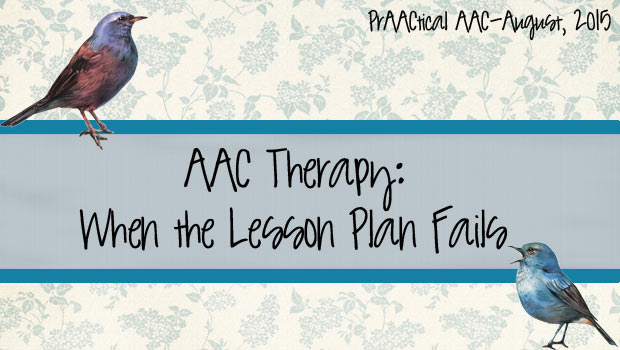
We’ve all been there. You have meaningful goals, engaging materials, and a solid lesson plan for our therapy session. Five minutes into the session, it’s clear that the AAC learner has little or no interest in what we’ve prepared. Now what? Our choices are limited: persevere with the plan, modify it somewhat, or scrap it entirely. What’s a clinician to do? Take A Breath The first thing to do is breathe. Know that you are not the first one to struggle to engage this learner, and you won’t be the last. Think of it not as an excuse for an unproductive session but as a problem-solving challenge. Previous clinicians may have justified the session’s difficulties and atttibuted them to the learner’s lack of engagement, limited attention span, or behavioral problems. Personally, I feel sad for those clinicians because when we take that approach, not only do we fail the client,... [Read More...]









